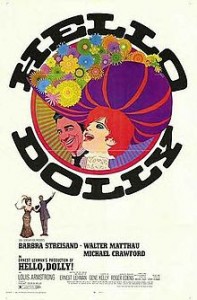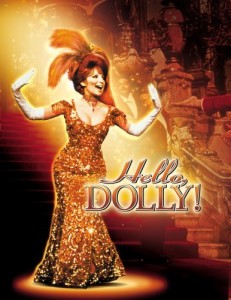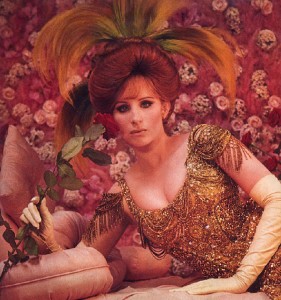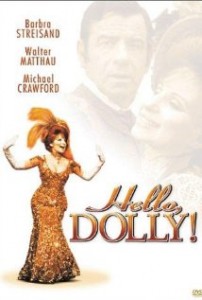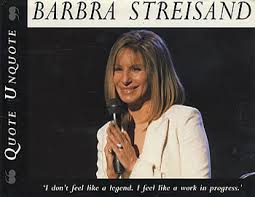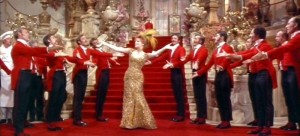Hello, Dolly! ***** (1969, Barbra Streisand, Walter Matthau, Michael Crawford, Louis Armstrong, Danny Lockin, Tommy Tune, Fritz Feld) – Classic Movie Review 1233
Director Gene Kelly’s gloriously tuneful and delightful 1969 movie of Jerry Herman’s 1964 Broadway magical musical, based on Thornton Wilder’s classic play The Matchmaker, won three Oscars.
The 27-year-old Barbra Streisand may be far too young to play the matronly, meddling middle-aged, match-making widow Dolly Levi, but she gives a vivacious, high-energy, magnetic performance, and sings like a bird. She really dominates everything around her, apart from co-star Walter Matthau.
In the story, Dolly travels to Yonkers, New York, to find a match for the miserly ‘well-known, unmarried half-a-millionaire’ Horace Vandergelder, but it finally becomes clear that Dolly intends to marry Horace herself. An ideally cast Walter Matthau (in his only movie musical) is a perfect co-star for Streisand as the mean, rich and grouchy merchant Horace Vendergelder (‘on those cold winter nights, Horace, you can snuggle up to your cash register; it’s a little lumpy, but it rings’) she eventually sets her sights on.
As part of her conniving, Dolly convinces Horace’s weepy niece, Ermengarde (Joyce Ames), his niece’s intended, the young artist Ambrose Kemper (Tommy Tune), and Horace’s two clerks, Cornelius Hackl and Barnaby Tucker (Danny Lockin), to travel to New York City.
Unfortunately Michael Crawford’s like an English fish out of water in an American lake as the juvenile lead Cornelius Hackl, Louis Armstrong compensates when he comes on to sing his chart hit title song with Barbra. Armstrong’s recording of the tune was a number-one single in May 1964. The cast also includes Danny Lockin, Tommy Tune, Fritz Feld, Marianne McAndrew and E. J. Peaker.
Kelly directs with golden era MGM musical-style old-fashioned expertise and Chenault Productions provide the on and off-screen talent and vast scale the production needs – and everything is beautifully crafted and just first rate. Ernest Lehman provides the expert screenplay (and also produces); cinematographer Harry Stradling Sr makes both the movie and its star look great in 65 mm Todd-AO.
Most of the original Broadway production’s fantastic score is kept in the film. ‘Just Leave Everything to Me’ and ‘Love Is Only Love’ were not in the stage show. Jerry Herman wrote ‘Just Leave Everything to Me’ especially for Streisand, replacing ‘I Put My Hand In’ from the show. Herman wrote ‘Love is Only Love’ for the stage version of Mame, but it was cut before its Broadway premiere.
Oscars for Best Art Direction/ Set Decoration, Best Sound (Jack Solomon, Murray Spivak) and Best Music (Lennie Hayton and Lionel Newman). All those sets – and the film – cost a fortune at the time, $25 million. Though it performed well and earned $26 million, it lost its backers an estimated $10million.
It’s a long show at 146 minutes , but the time just wizzes by; mistakenly cut versions run at 129 and 118 minutes.
All the actors do their own singing, except for Marianne McAndrew (Irene Molloy), whose singing is dubbed by Melissa Stafford and Gilda Maiken. Choreography is by Michael Kidd.
The town of Garrison, New York, was the filming site for scenes in ‘Yonkers’.
Streisand and Matthau didn’t see eye to eye. He refused to be around her except when required to do so by the script. He is quoted as telling her that she ‘had no more talent than a butterfly’s fart’.
The large fountain in the Harmonia Gardens set was reused in The Towering Inferno (1974).
Derek Winnert is the author of Barbra Streisand Quote Unquote.
RIP Jerry Herman, the Hello, Dolly! and La Cage aux Folles composer, who died on 27 December 2019, aged 88: ‘One of the greats’.
© Derek Winnert 2014 Classic Film Review 1233
Link to Derek Winnert’s home page for more film reviews: http://derekwinnert.com/

